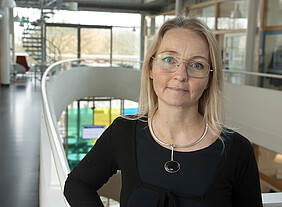will take place on Tuesday, 20 June 2017 from 17:15 to 18:15 hours in CBBM Research Building, EG, Room 50/51.
Host: Dr. Henriette Kirchner
Department of Internal Medicine I
University of Lübeck
Abstract
It is well established that combinations of genetic and environmental factors affect the susceptibility for metabolic disease e.g. type 2 diabetes. While ageing, obesity and physical inactivity represent non-genetic risk factors for metabolic disease, genome-wide association studies have identified common genetic variants associated with disease. However, epigenetic modifications such as DNA methylation and histone modifications may also promote metabolic disease. Indeed, studies from our group demonstrate that epigenetic variation is involved in the pathogenesis of type 2 diabetes and altered metabolism in humans. We have identified altered DNA methylation patterns in pancreatic islets, the liver, skeletal muscle and adipose tissue from patients from type 2 diabetes compared with non-diabetic controls. We have also shown that environmental factors, including exercise and diet, affect the DNA methylation pattern in human skeletal muscle and adipose tissue. Moreover, we recently demonstrated that polymorphisms associated with type 2 diabetes directly modify the epigenetic pattern in human tissues. Finally, our data also support that an impaired intrauterine environment affect the epigenome in humans, which may contribute to metabolic diseases. Together, our studies support that epigenetic variation contributes to metabolic disease and type 2 diabetes.
Biosketch
Dr. Charlotte Ling is a Professor at Lund University and a principle investigator of the Epigenetics and Diabetes Unit at Lund University Diabetes Centre (LUDC), Sweden. She obtained her PhD in Endocrinology at University of Gothenburg, Sweden in 2002. After a postdoc at Lund University, where she studied genetics of type 2 diabetes, she dedicated her research to the study of epigenetic mechanisms causing type 2 diabetes and metabolic disease. Her research group has pioneered the field of epigenetics in type 2 diabetes. They have made several groundbreaking discoveries such as genome-wide epigenetic modifications in pancreatic islets, skeletal muscle, adipose tissue and the liver from patients with type 2 diabetes compared with non-diabetic control subjects. Dr. Ling’s research group has also shown that genetic and non-genetic factors such as SNPs, exercise, diet, obesity and age alter the genome-wide epigenetic pattern in human primary tissues for type 2 diabetes. Dr. Ling is frequently invited to write review papers and book chapters and to give lectures (e.g. ADA, IDF, Keystone and Endocrine Society) on the topic ‘Epigenetics in Type 2 Diabetes’. Dr. Ling has been awarded research grants from numerous national and international foundations including the Swedish Research Council, Novo Nordisk Excellence award, EFSD-Lilly, Söderberg’s foundation and the European Commission (H2020).


